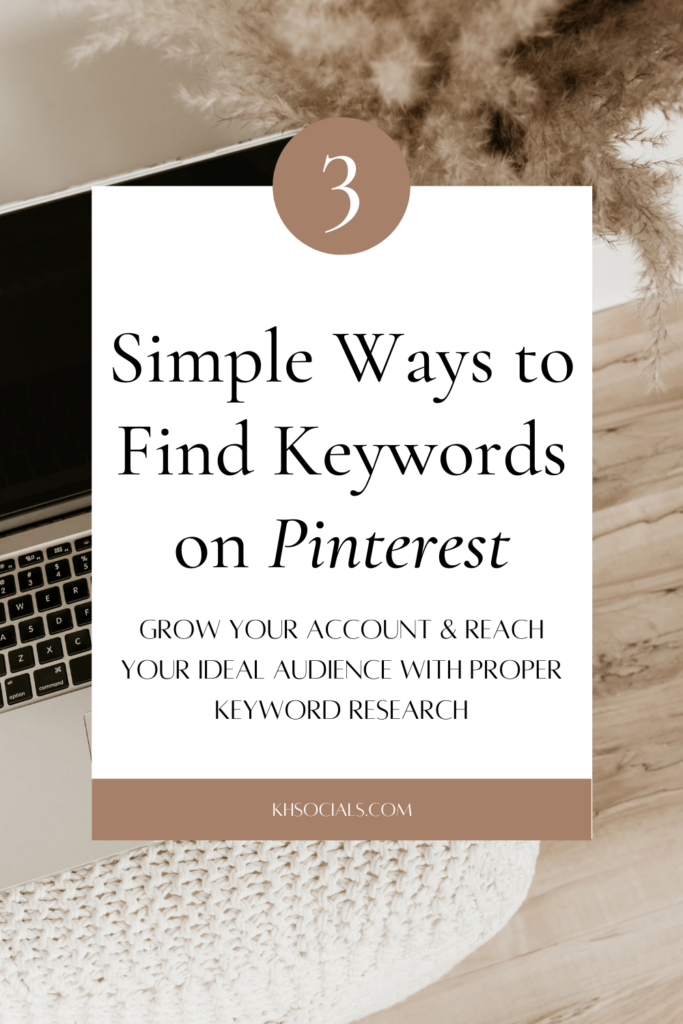
One of the most important parts of a strong Pinterest marketing strategy is your keyword research- Pinterest is a (visual) search engine, so you need to get your SEO right in order to reach your ideal audience! I know words like SEO and keyword research can sound overwhelming, but I’m going to show you jhow to find Pinterest keywords that will help you to crush your Pinterest marketing goals in just 3 simple steps!
Used properly, Pinterest keywords that will help you to rank high in the Pinterest search results (which will lead to higher website traffic, and higher growth!). It’s easy to get caught up in the aesthetic side of Pinterest, but keyword research is seriously the backbone of a good Pinterest strategy!
We talked in a previous post about where to use your keywords, but today we’re going to look at how to find them.
To begin searching, you’ll need to have a few general keywords in mind- basic keywords that describe who you are and what you offer. For example, my general keywords would be “Pinterest marketing,” “Pinterest management,” etc. We’ll use these very general keywords to start digging in and getting more specific.
So, here we go! The 3 easy ways to find keywords on Pinterest…
1. Find your Pinterest keywords using the search bar
The first place you’ll start is with your Pinterest search bar, and this is where 90% of your keyword research will occur.
When you type search terms into Pinterest, it will start to auto populate the most popular search terms for you. Thank you, Pinterest! This shows you what people are search for around your specific topics.
For this post, I’m going to use the example of “Vegan Recipes.” So, we begin typing this general keyword into the search bar and we get…
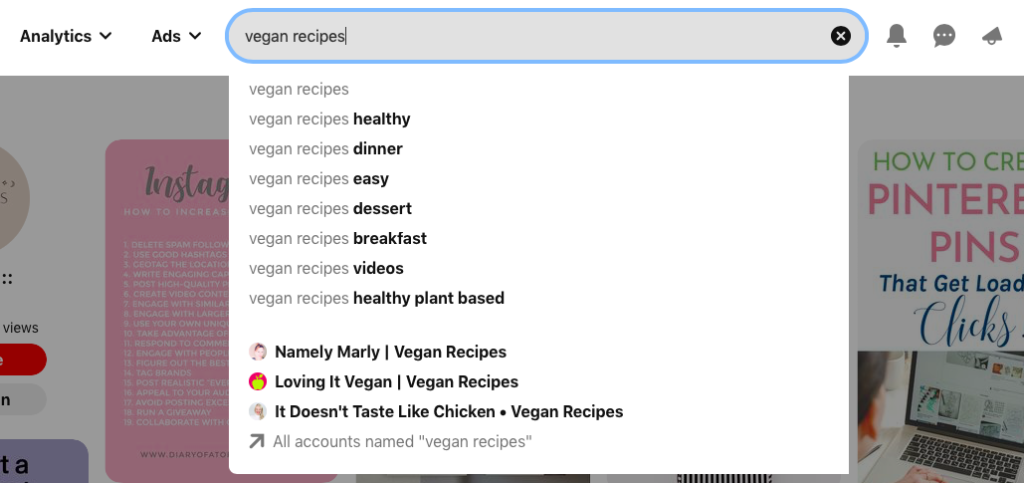
You can see people who search for vegan recipes are often specifically typing in healthy vegan recipes, vegan recipes dinner, easy vegan recipes, etc.
Write these down, and then start to dig a little deeper. Go through this initial list, and then searching each auto populated search term to get more specific.
For example, when we type in vegan recipes healthy, we get…
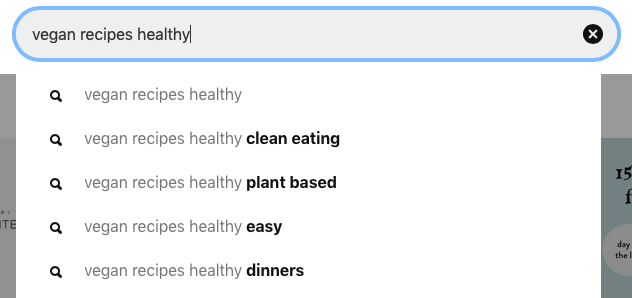
Make sure you’re only writing down the keywords that actually apply to you. For example, if you make more advanced recipes, “vegan recipes healthy easy” won’t be a keyword for you.
Next, I’ll start to think about other phrases that people may be searching for. For example, I always like typing in my main keyword + how to. You’ll find lots of great keywords (and content ideas!) through this.
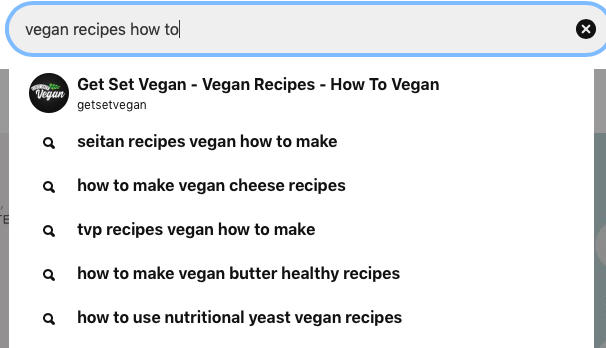
Continue going through these steps with all of your main keywords, and record all of your relevant keywords in a spreadsheet (or whatever format works for you) for future use.
NOTE: Typically, people are searching for short keywords on Pinterest, rather than long-tail keywords. They’re in browsing/discovery mode, so they’re usually searching more broad terms than detailed term (ex. healthy vegan recipes vs. healthy chickpea curry vegan recipes), so 2-3 word keywords will generally be your sweet spot.
2. Find your keywords in Pinterest’s suggested search terms
NOTE: Pinterest has recently removed these bubble search terms. However, there is some talk that they’ll be back, so this step doesn’t apply now, but may be relevant again in the future.
To start off, I still want to keep the search general, so I did a search for vegan recipes. When Pinterest showed me my search results, they also include these bubbled keywords at the top of the page with suggested search terms. These are terms that Pinners are often searching for.

The terms on the left-hand side are the keywords that are most popular, and the keywords on the right are the terms that are less popular (but still frequently searched). The more popular searches will be harder to rank for, so don’t write off the less popular terms as unhelpful. Particularly if you’re smaller or just starting out, using these less popular keywords can help you to get your content in front of people because there will be less competition.
Looking for more Pinterest tips? Grab my FREE ebook here!
Write down all of the suggested terms that apply to you- these will be your long-tail keywords.
You can continue to get more and more specific and get more detailed keywords. Say you focus on creating easy vegan recipes. You’d click on the easy bubble, and Pinterest will show you results for what people are searching for easy vegan recipes.

You can see that by doing this you’ll get a solid list of keywords that your audience is looking for. Don’t be afraid to get specific- the more specific you are, the easier people who are looking for exactly what you offer can find you, and the easier you’ll show up in the results.
I like to track my keywords in a spreadsheet.
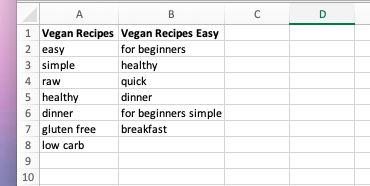
3. Use the Pinterest Ads keyword tool
For the last step, we’ll be initializing an Ads setup, but you don’t actually need to create an Ad. When you set up an Ad, Pinterest guides you in doing keyword research to help make your Ad more effective. So we can use the keywords they suggest in our organic pins.
To get started,
- Go to your menu bar and click Ads > Create Ad.
- Choose Consideration as your Campaign Objective, enter a campaign name, and then scroll down and hit continue.
- Under Targeting Details, select “find new customers,” and then scroll down to click on Keywords & Interests.
- Click add keywords, and then type in your broad keyword terms (i.e. vegan recipes, etc.)
Pinterest will then show you a list of related keywords, along with the number of monthly searches for each term. This is a really great way to see what people are searching for and to find more broad keywords that you can use that you may not already have thought of.
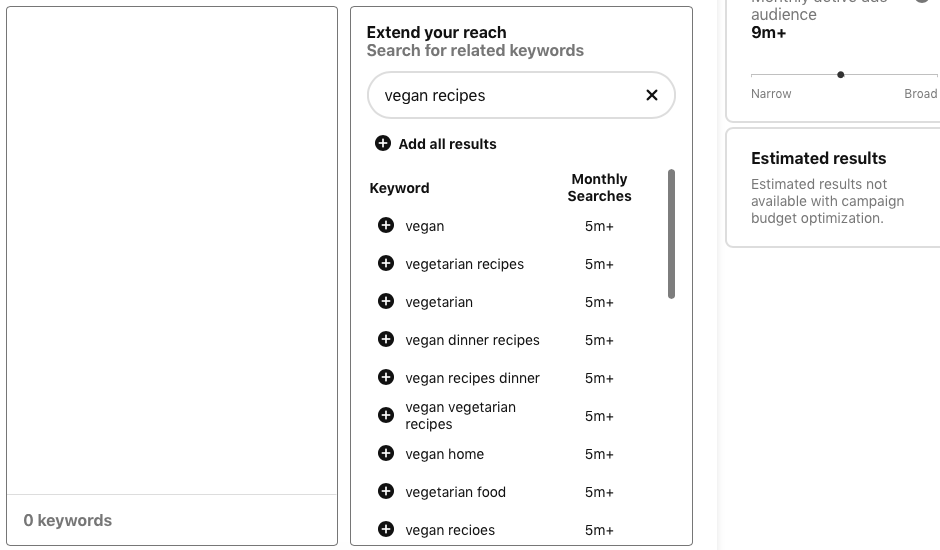
Make a list of the broad keywords that apply to your business and then repeat steps 1 and 2 with these keywords to increase your list.
Doing your keyword research can be a little time consuming at first, but it really isn’t difficult, and it is a make or break factor in seeing success on Pinterest. Plus, once you do your initial keyword research, you’ve done the bulk of your work.
I recommend doing a deep keyword research for your account up front, and then periodically you can do a refresher and add to/edit the list.
You’ll also want to do keyword research for the individual Pins you create, but this doesn’t need to be as in depth or time consuming. For example, you can do a deep dive for your vegan recipes blog, and then do a quicker search for your individual recipes.
Bonus Tip #1: another great way to find keywords (and headlines/text overlay) is to take a look at the pins that show up in the top search results. The pins that shop up in the first few lines of your search results are really popular pins, so take a look at what they’re doing (with their headlines, text overlay, keywords, images, etc.) and integrate what you find into your own Pins.
Bonus Tip #2: Doing your keyword research isn’t just a great way to find your keywords- it’s also a great way to plan your content! Take a look at the popular long tail keywords in your niche and consider these as topics for future blog posts if you haven’t already!
Once you have your keywords, head over to this post here to learn where you should be using them in your account.
Interested in done-for-you Pinterest management? Head over to my services page here!
PIN IT FOR LATER
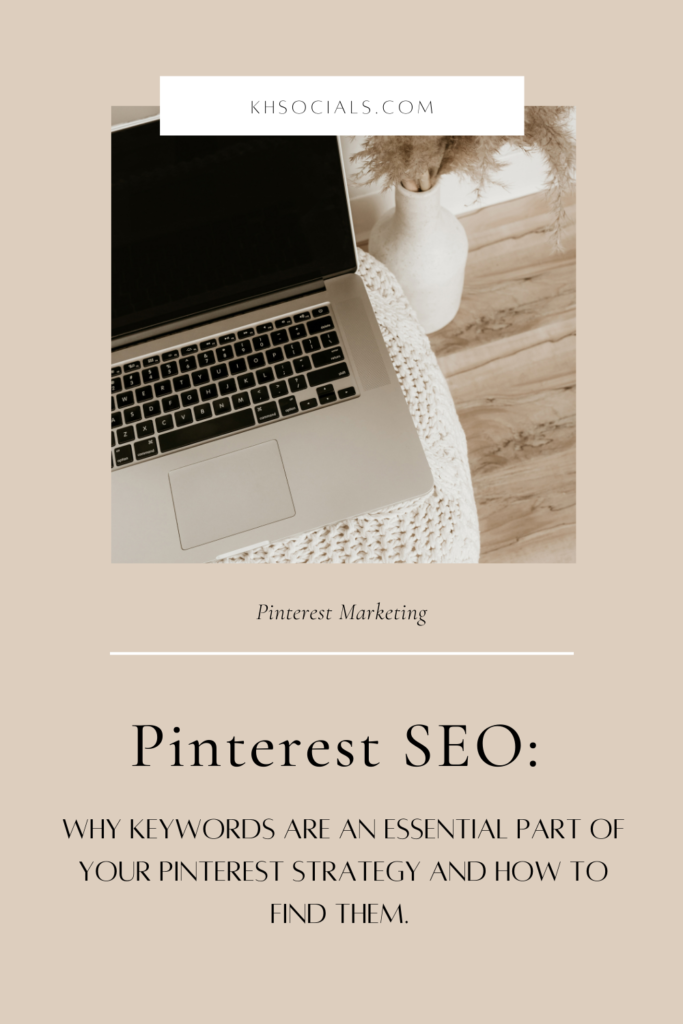
[…] Now that you know where to use your keywords, discover how to do your keyword research here! […]
[…] Remember, Pinterest is a search engine, so you’ll want to do good keyword research for your industry to make sure you’re writing keyword rich descriptions and headlines for your Pins so they show up when people are searching for products in your category. You can learn more about keyword research here. […]
[…] Pinterest is a visual search engine, so good keywording and SEO are essential to seeing success on the platform. Proper keywording tells Pinterest who you are, what you’re offering, and who to deliver your content to. You can learn all about keywording here. […]
Hey there, You have done an excellent job. I’ll certainly
digg it and personally suggest to my friends. I am sure they’ll be benefited from this web site.